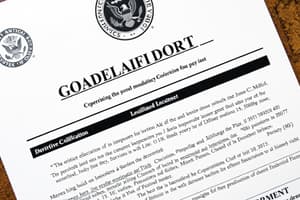Podcast
Questions and Answers
What condition did Antony place on the sale of the dagger to Brutus?
What condition did Antony place on the sale of the dagger to Brutus?
- Brutus needed to provide payment before receiving the dagger. (correct)
- The dagger would be given before payment.
- Brutus could take the dagger on credit.
- Antony would sell the dagger to Cassius.
Brutus was able to obtain the dagger after showing up with the money.
Brutus was able to obtain the dagger after showing up with the money.
False (B)
Who ultimately acquired the dagger?
Who ultimately acquired the dagger?
Cassius
Antony's response after Brutus presented the money was, 'oh, I sold it to ______ last week.'
Antony's response after Brutus presented the money was, 'oh, I sold it to ______ last week.'
Match each character with their role in the dagger transaction:
Match each character with their role in the dagger transaction:
Which principle is crucial to the concept of derivative acquisition in Scottish property law?
Which principle is crucial to the concept of derivative acquisition in Scottish property law?
In Scottish law, ownership can be retained even when the right to use and fruits is parted with.
In Scottish law, ownership can be retained even when the right to use and fruits is parted with.
What is meant by 'defective acquisition' in the context of property law?
What is meant by 'defective acquisition' in the context of property law?
According to the definition of ownership, the terms usus, fructus, and ______ refer to the rights associated with property.
According to the definition of ownership, the terms usus, fructus, and ______ refer to the rights associated with property.
Match the following terms with their definitions in Scots property law:
Match the following terms with their definitions in Scots property law:
Flashcards
Derivative Acquisition
Derivative Acquisition
Acquiring ownership of property from someone who already owns it.
Property Rights
Property Rights
Legal rights associated with a particular piece of property.
Brutus's claim
Brutus's claim
Brutus's right of acquiring the dagger from Antony, based on an agreement.
Cassius's Interference
Cassius's Interference
Signup and view all the flashcards
Priority in time
Priority in time
Signup and view all the flashcards
Derivative Acquisition
Derivative Acquisition
Signup and view all the flashcards
Right of Disposal
Right of Disposal
Signup and view all the flashcards
Ownership Rights
Ownership Rights
Signup and view all the flashcards
Heritable Property
Heritable Property
Signup and view all the flashcards
Moveable Property
Moveable Property
Signup and view all the flashcards
Study Notes
Derivative Acquisition
- Derivative acquisition involves the process of disposal or transmission of property, distinct from original acquisition.
- The right of disposal is a core aspect of ownership.
- Ownership encompasses rights to use, fruits, and disposal of property.
- The right of disposal can be transferred, but not if the person lacks authority.
- A two-stage process is essential in transferring property. This involves a contract and conveyance.
- Real rights are available against the whole world, while personal rights are specific to individuals.
- Personal rights do not involve a right of disposal.
- The transfer of ownership is a two-stage process.
- A contract giving a personal right and the transfer of a real right involves a two-stage process.
- In contract, a personal right is created and in conveyance, a real right is transferred.
- Actual possession of property does not necessarily indicate ownership.
General Matters
- General matters apply to all forms of property.
- We are concerned with property in the sense of what is open to disposal.
- Ownership is made up of rights to use, fruits, and disposal.
- The right to dispose of property is essential to ownership.
Transfer of Ownership in Heritable Property
- Scots property law differentiates between heritable and moveable property.
- Heritable property is equated to land, deriving from 'that which goes to the heir'.
- Historically, primogeniture and male preference were rules in succession to heritage.
- Heritage could not be bequeathed until the Titles to Lands Consolidation Act 1886.
- 'Heritage' is now obsolete, with 'immoveables' preferred.
- Moveable property can become heritable by accession.
- The heritable/moveable distinction is relevant in succession and transfer of property.
- Various moveable things can be considered heritable.
- Accessory things belong to the property they accompany.
Transfer/Ownership in Moveable Property
- Ownership of moveable property is determined by contracts, acts, or law.
- A 3-stage process exists in transferring heritable property: missives, disposition, and registration.
- The general law of contract is applicable to property disputes. - The process of registering property is essential.
- Real rights are acquired via registration in relevant systems.
- Registration of acquisition marks the transfer of ownership.
- There is a period of vulnerability between completion of the contract and registration, during which the person selling the property could potentially sell or dispose of it twice.
Key Case Law and Legislation
- Key cases like Sharp v Thompson (1997) and Burnett's Trustee v Grainger (2004) illustrate the complexities of ownership transfer.
- The Sale of Goods Act (1979) is relevant to the transfer of moveable goods.
- Legislation dealing with property transfer is critical.
Studying That Suits You
Use AI to generate personalized quizzes and flashcards to suit your learning preferences.




